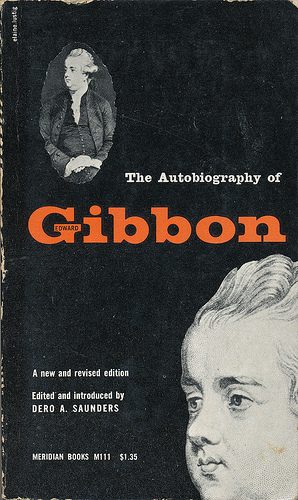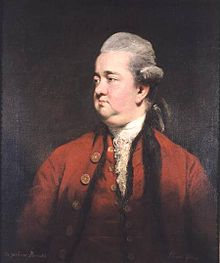
“Every man who rises above the common level has received two educations: the first from his teachers; the second, more personal and important, from himself.”
“The warm desires, the long expectations of youth, are founded on the ignorance of themselves and of the world. They are gradually damped by disappointment and possessions; and after the middle season the crowd must be content to remain at the foot of the mountain, while the few who have climbed to the summit aspire to descend or expect to fall. In old age the consolation of hope is reserved for the tenderness of parents, who commence a new life in their children; the faith of enthusiasts who sing hallelujahs above the clouds; and the vanity of authors, who presume the immortality of their name and writings.”
Selection from The Autobiography of Edward Gibbon
Edward Gibbon, author of The Decline and Fall of the Roman Empire, wrote his autobiography between 1788 and 1791. In it he “sighed as a lover but obeyed like a son;” was “never less alone than by himself;” declared it is better to “read one book many times rather than many books once;” observed that “the tears of a son are seldom lasting;” and noted that “the pains and pleasures of the body are an indelicate topic of conversation.”
In 1764, he conceived the history of the decline and fall in Rome while sitting musing amid the ruins of the Capitol as “the barefooted friars where [sic] singing vespers in the temple of Jupiter.” He soon became disgusted with “the modest practice of reading his manuscript to his friends,” of whom some would praise from politeness and others criticize from vanity, concluding that the author is the best judge of his own performance, since none has so deeply meditated on the subject. The style of the author, he thought, should command the image of his mind, but “the choice and command of the language is the fruit of exercise.” Before publishing his book he found himself shrinking from the press with the “terrors of virgin modesty,” recalling old adages such as to “expect the mature age of fifty” before giving ones writings to the public, or even more severely, locking up his manuscript for nine years.

Sir Joshua Reynolds (1723-1792)
Oil on canvas
In a notable paragraph he describes his emotions on finishing his book:
“I have presumed to mark the moment of conception; I shall now commemorate the hour of my final deliverance. It was on the day, or rather, night, of the twenty-seventh of June 1787, between the hours of eleven and twelve, that I wrote the last lines of the last page in a summer house of my garden. After laying down my pen I took several turns in a berceau, or covered walk of acacias, which commands a prospect of the country, the lake, and the mountains. The air was temperate, the sky was serene, the silver orb of the moon was reflected from the waters, and all nature was silent. I would not dissemble the first emotions of joy on recovery of my freedom, and perhaps the establishment of my fame. But my pride was soon humbled, and the sober melancholy was spread over my mind, by the idea that I had taken an everlasting leave of an old and agreeable companion, and that whatsoever might be the future fate of my History, the life of the historian must be short and precarious.”
Five years before his death, caused by peritonitis after several attempts to drain a huge hydrocele, he wistfully reflected that “the present is a fleeting moment; the past is no more; and our prospect of futurity is dark and doubtful.” According to the laws of probability, “so true in general, so fallacious in particular” he had expected to live another 15 years in what some sages have called the most agreeable period of life, observing however that the “abbreviation of time and the failure of hope will always tinge with a browner shade the evening of life.”

Leave a Reply